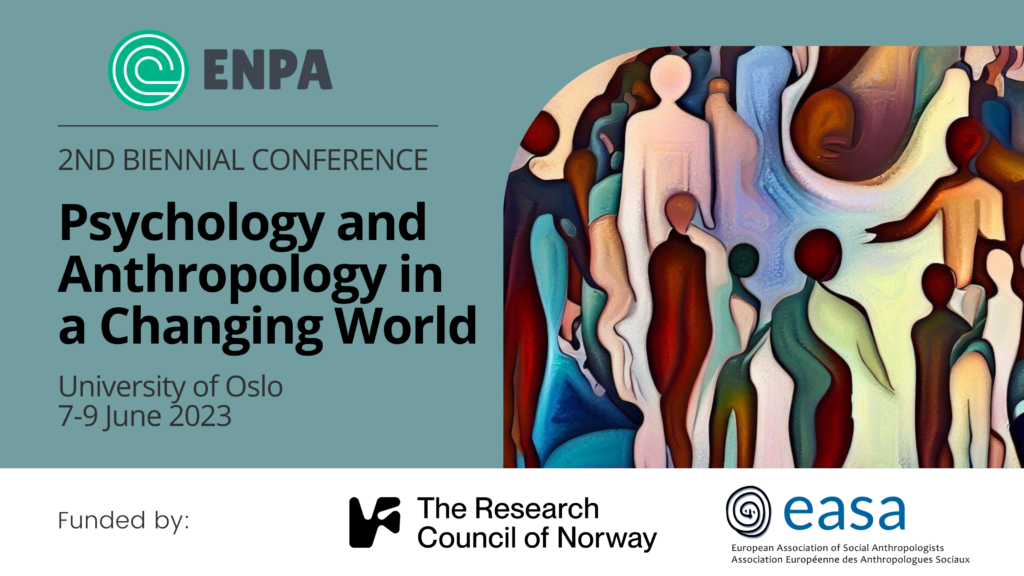The second ENPA Biennial Conference “Psychology and Anthropology in a Changing World” took place 7-9 June 2023 in Oslo and online. The conference was hosted by the University of Oslo.

The conference was preceded by the Writing (Co-)Lab: ENPA Pre-Conference Workshop for Graduate Students and Early Career Scholars.
Conference theme: Psychology and Anthropology in a Changing World
Psychology and anthropology are disciplines with an overlapping and sometimes fractious relationship. Today there is perhaps a growing sense of the need for an interdisciplinary conversation from both sides. The growth of interest in psychological anthropology provides one example of this as does the rise of interest in issues concerning cultural diversity and representation with psy-disciplines on the other.
As in the case of the first ENPA Biennial, this conference will be launched as an inclusive forum for scholars from a wide range of disciplinary and thematic orientations to discuss, theorize and reflect on historically and socio-culturally situated concepts of [i.e. the mind, the body, and their entanglements in cultural, social, and/or political worlds]. Critical perspectives on the concepts of mainstream psychology are encouraged; productive engagements across the disciplinary boundaries of anthropology and cognitive science, psychiatry, philosophy, evolutionary biology, and others will also be welcome. We also welcome discussion that touches upon contemporary practical and political issues, such as the role of diversity in mental health services, whilst also allowing for a re-examination of related classic or broader theoretical themes, such as how we conceptualise the nature of cultural difference in psychology in a globally interconnected world.
Through a fruitful dialogue within and between disciplines, the European Network for Psychological Anthropology (ENPA) aims to foster new insights not only in research contexts, but also in policy-making, therapy, and healing.
Keynote Speakers

Susanne Bregnbæk
Statelessness, transformative experience and the multiple-self
Susanne Bregnbæk is an Associate Professor at University College Copenhagen.
This lecture examines the problem of statelessness by exploring the transformative experience of estrangement by a Kurdish Iranian refugee named Hiwa in exile in Denmark. Through a person-centered account, I ask how we as ethnographers can understand the inner life of another, including experiences that sometimes elude conventional language? Drawing on psychoanalytic theories of “the multiple self”, I describe Hiwa’s changing self-states as involving a triple reorientation in the form of an estranged relationship to his past, present and envisioned future. I suggest that literary expressions, such as Kurdish poetry and writing about exile provided a means through which an inner world of emotions could be shared. The paper seeks to provide a window to the human consequences of the ”Paradigm Shift Law” in Danish asylum policies, which entailed making all residence permits temporary – and more broadly to the growing problem of statelessness in Europe.

Tanya Marie Luhrmann
Voices of madness, voices of spirit
Tanya Marie Luhrmann is the Albert Ray Lang Professor of Anthropology (and Psychology, by courtesy) at Stanford University.
They seem like strange experiences—a voice whispered on the wind, a god who speaks from on high—but voices are far more common than we think. In this talk, I argue that voices—the sense of being called by another—are at the heart of the human experience of mind. Our minds are deeply social—less interior inner universes, more like dinner parties with noisy guests. Religion is a way of using that social dimension to your advantage—crafting an inner coach who is not the self and who, by being other, manages the inner cacophony. Sometimes of course this process goes terribly wrong. I hope we open a discussion about how people use social practice to shape inner worlds and moral purpose, and about the complex relationship of spiritual experience and psychosis.
Conference programme
The full conference programme with abstracts is available here (pdf).
